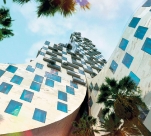Boscolo Hotel Nice

The global warming issues is one of those popular bogeyman stories of the period, which seems to be the biggest threat to the planet since the Cold War. The nature’s nasty shocks induced by anthropogenic factors are getting more severe and occurring ever more frequent. The purely human concern is how to organize social and private life in a sustainable way that balances social, environmental and economic concerns.
No doubt, that booming urbanization does its bit into the climatic shift. Since more than half of the planets population lives in cities and the majority of our energy consumption stems from the city urbanism and architecture holds a strategic position in this challenge. The extensive mode of urbanization probably leads up to a bunch of serious transport, ecological and social issues.
That’s why the cities are likely to grow taller and getting denser, which allow to manage with less sophisticated infrastructure of any kind, whilst the public transit system becomes more compact and effective. Since if transportation demand is less, there’s less pollution, better health etc. Density supports better viability of public services (ie. theatres, shops, restaurants etc). A denser city will lead to better and safer city life. A denser city has more efficient infrastructure and supply networks (heating, power, water etc).
The most special urban phenomena is the “tall trend”. By combining private and public, commercial and cultural functions we get the advantages of being able to scale each function to its specific needs. Being perfect landmarks, the beautiful high-rise buildings are branding the city and increase tourism. Statistics reveal that urban populations spend less energy per capita for heating, cooling and transportation than suburban populations.
High-rise buildings with a large gross floor area are required to consume less energy per sq. m compared to low-rise. Large buildings may consume 70 kWh/ m²/year, whilst small buildings can consume up to 300 kWh/m²/year. The denser the better, when densification occurs in urban centres where pedestrian and public transportation networks are available. Tall buildings are also beneficial in terms of investment: the value increases as the view gets better.
Building sustainable is a good business (+avoids decrease in building value); unique bring identity and branding values to the owner, whilst the occupants take another opportunity to strut their stuff so extravagant way. The BIG’s professionals follow the trend toward denser development. Rather than continuing the modern expansion and explosion of the city in the form of scattered developments along the periphery of the city they propose to concentrate both public and private programs at the very heart of the city.
Project – Boscolo Hotel Nice
Phase – Draft
Client – Boscolo
Total area – 25,000 m²
Location – Nice, France
Hotel: 2800 m²
Public, outdoor: 10000 m²
Public, indoor: 3300 m²
Full version you can download here
 Information provided by BIG
Information provided by BIG


